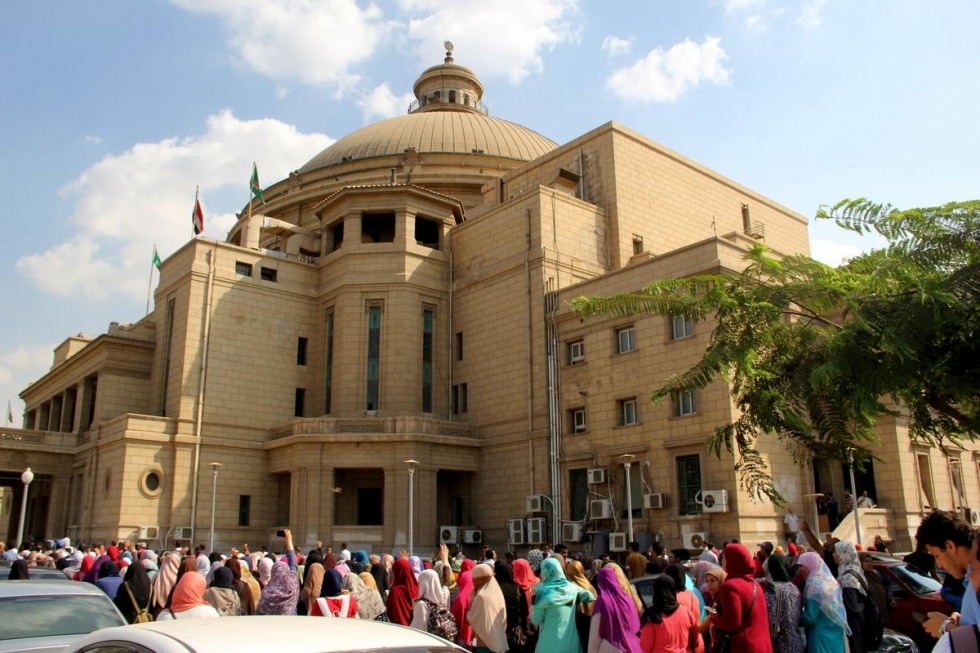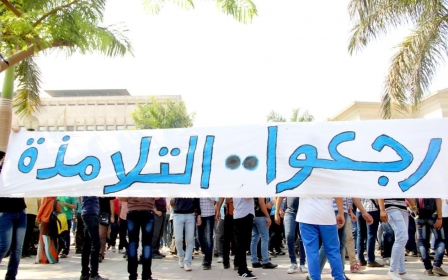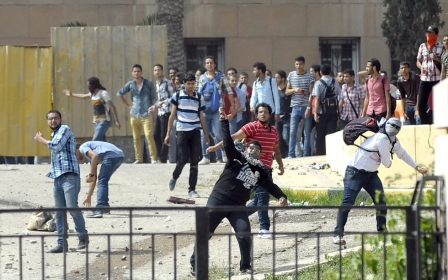Egyptian students face mandatory drug tests, denied campus housing

As university students in Cairo launch a week-long protest campaign against the tightening grip of security forces on their campuses, it has emerged that more than 10,000 at Cairo University have been forced to undergo drug tests before being allowed to take up residence in their rooms.
“All students who applied for university accommodation were forced to take drug tests and run criminal record checks before they were given access to their rooms,” Hassan Farid, spokesperson for Students against the Coup at Cairo University, told MEE on Monday.
Students Against the Coup is a nationwide student-led movement with representatives across most public and private Egyptian universities. The movement - established after the ouster of President Mohamed Morsi by a military-backed coup in July 2013 - coordinates regular on-campus anti-government protests.
Cairo University President Gaber Nassar assured students that these tests are “for their own benefit,” Al-Ahram Online reported on Saturday. No further explanation for the procedure was given.
Farid also revealed that: “The university administration has forced everyone to sign a document giving their consent to random searches of their rooms at any given time."
Egyptian university campuses have been seedbeds for collaboration among youth groups who led the 2011 uprising against former President Hosni Mubarak.
After the military took power in the summer of 2013, student protests shut down classes at several major universities for most of the school year. While security forces managed to crush street protests by outlawing demonstrations, university protests continued. At least 14 students were killed in clashes with police, and thousands were arrested; more than 900 remain in prison more than a year later, according to Students Against the Coup.
Novel security measures imposed at the start of a new academic year - including security guards from private security company, Falcon, metal detectors and mandatory carrying of student schedules – have been coupled with the arrest of scores of students from their homes and on-campus.
In response, nationwide protests on university campuses have been held since school started belatedly last week. On Monday, students at al-Azhar and Cairo Universities reportedly launched on a week-long “breaking the siege” campaign.
Students told MEE that the government's new moves are an attempt to stifle student activism and crush a renewed wave of protests against the military-backed government.
“These measures are a complete humiliation for us; we are all extremely frustrated,” said Farid.
“We are being forced to believe that upon entering university, we must leave our freedom and dignity at the gates,” he added.
Samira, an engineering student at Cairo University who preferred to use only her first name for security, agrees that the measures being used aim to crackdown on students’ freedom of expression and activism.
“Any student who took part in the protests last year and was detained already has a criminal record. They are automatically rejected if they apply for university accommodation,” she said.
At Al-Azhar University, security measures at student dormitories have taken a completely new level. Thousands of male and female students have not been allowed to take up residence altogether.
“About 10,000 female students have the right to on-campus accommodation, yet most of them have been unable to take up residence until today,” said Hafsa Farouq, a student and spokesperson for Students against Coup at al-Azhar University.
“At least five thousand girls from upper Egypt have missed a whole week of classes so far. They haven’t been given access to their rooms and they can’t afford alternative accommodation, so they’ve just stayed home,” Farouq told MEE.
According to Farouq, while students have previously been given their rooms on the first day of classes, this year the school's administration has repeatedly told them that no ‘specific schedule’ has been assigned for the process this year.
New MEE newsletter: Jerusalem Dispatch
Sign up to get the latest insights and analysis on Israel-Palestine, alongside Turkey Unpacked and other MEE newsletters
Middle East Eye delivers independent and unrivalled coverage and analysis of the Middle East, North Africa and beyond. To learn more about republishing this content and the associated fees, please fill out this form. More about MEE can be found here.




